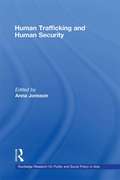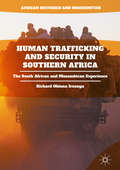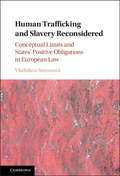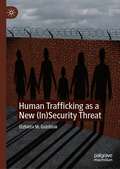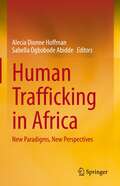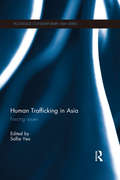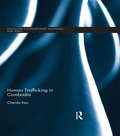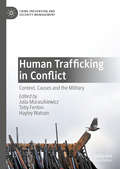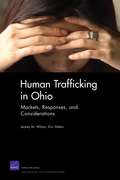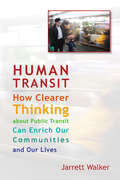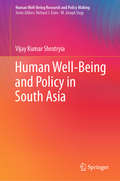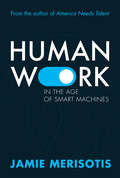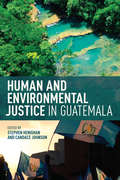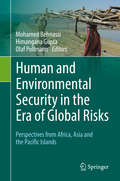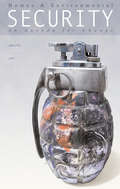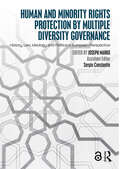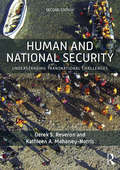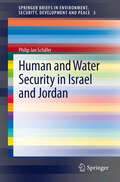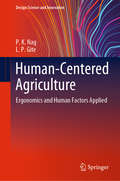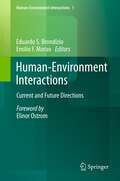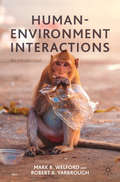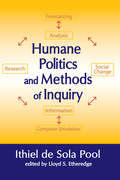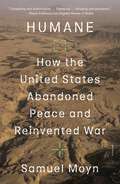- Table View
- List View
Human Trafficking and Human Security (Routledge Transnational Crime and Corruption #Vol. 4)
by Anna JonssonHuman trafficking, and the related problems of organised crime and prostitution, has become a serious problem for post-Soviet countries since the dissolution of the Soviet Union. Human trafficking has a major impact on the countries of origin, the destination countries and the countries of transit, and is a concern for those studying population and migration, economics, politics, international relations and security studies. This book examines human trafficking from post-Soviet countries, exploring the full extent of the problem and discussing countermeasures, both local and at the global level, and considering the problem in all its aspects. It focuses in particular on the experiences of the Baltic Sea region, setting out the nature of organised crime and the full range of threats against society.
Human Trafficking and Security in Southern Africa: The South African and Mozambican Experience (African Histories and Modernities)
by Richard Obinna IroanyaThis book investigates the links between human trafficking and national security in Southern Africa. Human trafficking violates borders, supports organised crime and corrupts border officials, and yet policymakers rarely view the persistence of human trafficking as a security issue. Adopting an expanded conceptualisation of security to encompass the individual as well as the state, Richard Obinna Iroanya lays the groundwork for understanding human trafficking as a security threat. He outlines the conditions and patterns of human trafficking globally before moving into detailed case studies of South Africa and Mozambique. Together, these case studies bring into focus the lives of the ‘hidden population’ in the region, with analysis and policy recommendations for combating a global phenomenon.
Human Trafficking and Slavery Reconsidered
by Vladislava StoyanovaBy reconsidering the definitions of human trafficking, slavery, servitude and forced labour, Vladislava Stoyanova demonstrates how, in embracing the human trafficking framework, the international community has sidelined the human rights law commitments against slavery, servitude and forced labour that in many respects provide better protection for abused migrants. Stoyanova proposes two corrective steps to this development: placing a renewed emphasis on determining the definitional scope of slavery, servitude or forced labour, and gaining a clearer understanding of states' positive human rights obligations. This book compares anti-trafficking and human rights frameworks side-by-side and focuses its analysis on the Council of Europe's Trafficking Convention and Article 4 of the European Convention on Human Rights. With innovative arguments and pertinent case studies, this book is an important contribution to the field and will appeal to students, scholars and legal practitioners interested in human rights law, migration law, criminal law and EU law.
Human Trafficking as a New (In)Security Threat
by Elżbieta M. GoździakThis book challenges the rhetoric linking ‘war on terror’ with ‘war on human trafficking’ by juxtaposing lived experiences of survivors of trafficking, refugees, and labor migrants with macro-level security concerns. Drawing on research in the United States and in Europe, Goździak shows how human trafficking has replaced migration in public narratives, policy responses, and practice with migrants and analyzes lived experiences of (in)security of trafficked victims, irregular migrants, and asylum seekers. .
Human Trafficking in Africa: New Paradigms, New Perspectives
by Sabella Ogbobode Abidde Alecia Dionne HoffmanThis edited volume examines the contemporary practice of human trafficking on the African continent. It investigates the scourge of human trafficking in Africa from the broader international and regional perspectives as well as from a country-specific context. Written by a multi-disciplinary panel of academics and practitioners, the book is divided into three sections that highlight a wide range of issues. Section One examines the theoretical and legal challenges of trafficking. Section Two focuses on the regional and nation-state perspectives of human trafficking along with selected cases of trafficking. Section Three highlights the impact of trafficking on youth, with specific attention given to child soldiering and female victims of trafficking. Providing a multi-faceted approach to a problem that crosses multiple disciplines, this volume will be useful to scholars and students interested in African politics, African studies, migration, human rights, sociology, law, and economics as well as members of the diplomatic corps, governmental, intergovernmental, and non-governmental organizations.
Human Trafficking in Asia: Forcing Issues (Routledge Contemporary Asia Series)
by Sallie YeaBy analysing the complex issues surrounding internal and cross-border human trafficking in Asia, and asserting critical perspectives and methodologies, this book extends the range of sites for discussion and sectors in which human trafficking takes place. The book re-centres human trafficking as an area of legitimate academic inquiry in a region that is often considered as an epicentre for human trafficking: East and Southeast Asia. It thus offers an in-depth analysis and up-to-date knowledge on research methodologies and engagements, patterns and forms of human trafficking, constructively critiquing anti-trafficking campaigns and discourses, and offering examples of good practice within the region that help us move beyond the impasse that currently hampers human trafficking as a field of inquiry in the social sciences. Providing constructive avenues for human trafficking research to proceed methodologically, theoretically and ethically, this book is of interest to students and scholars of Politics, International Relations and Southeast Asian Studies.
Human Trafficking in Cambodia: Human Trafficking In Cambodia (Routledge Contemporary Southeast Asia Series)
by Chenda KeoReporting the findings of a comprehensive study of human trafficking in Cambodia, this book focuses on the characteristics and operations of the traffickers. It provides a theoretical framework that explains the emergence of the phenomenon, and the role of moral panic and western hegemony in the war on human trafficking. Using a multi-method and multi-source research design, which includes an examination of police and prison records as well as interviews with 91 incarcerated human traffickers, police and prison officers, court officials, and members of NGOs, this book investigates five major themes about human traffickers in Cambodia: who are they, how do they operate, how much profit do they make, why are they involved in human trafficking, and how does the Cambodian Criminal Justice System (CJS) control their activities? A novel and unique analysis, this book is of interest to a wide academic audience in the fields of Asian Studies, Human Trafficking, Sociology, Anthropology, Political Science, Human Geography and Critical Legal Studies.
Human Trafficking in Conflict: Context, Causes and the Military (Crime Prevention and Security Management)
by Hayley Watson Julia Muraszkiewicz Toby FentonThis edited book examines the different forms of human trafficking that manifest in conflict and post-conflict settings and considers how the military may help to address or even facilitate it. It explores how conflict can facilitate human trafficking, how it can manifest through a variety of case studies, followed by a discussion of the reasons why the military should include a stronger consideration of human trafficking within their strategic planning given the multiple scenarios in which military forces come into contact with victims of human trafficking, and how this ought to be done. Human Trafficking in Conflict draws on the expertise of scholars and practitioners to develop the existing conversations and to offer multiple perspectives. It includes a discussion of existing frameworks and perspectives including legal and policy, and whether they are configured to address human trafficking in conflict.
Human Trafficking in Ohio
by Erin Dalton Jeremy M. WilsonWilson and Dalton explore the extent and characteristics of human trafficking in Ohio through both a content analysis of newspaper accounts and interviews with criminal justice officials and social service providers. The authors identify and discuss sex-trafficking cases in Toledo and forced-labor cases in Columbus, and compare the two cities' responses to human trafficking. They conclude with suggestions on how these responses might be improved.
Human Transit: How Clearer Thinking about Public Transit Can Enrich Our Communities and Our Lives
by Jarrett WalkerPublic transit is a powerful tool for addressing a huge range of urban problems, including traffic congestion and economic development as well as climate change. But while many people support transit in the abstract, it's often hard to channel that support into good transit investments. Part of the problem is that transit debates attract many kinds of experts, who often talk past each other. Ordinary people listen to a little of this and decide that transit is impossible to figure out. Jarrett Walker believes that transit can be simple, if we focus first on the underlying geometry that all transit technologies share. In Human Transit, Walker supplies the basic tools, the critical questions, and the means to make smarter decisions about designing and implementing transit services. Human Transit explains the fundamental geometry of transit that shapes successful systems; the process for fitting technology to a particular community; and the local choices that lead to transit-friendly development. Whether you are in the field or simply a concerned citizen, here is an accessible guide to achieving successful public transit that will enrich any community.
Human Welfare, Rights, and Social Activism
by Jane PulkinghamJ.S. Woodsworth, a founding member and leader of the Cooperative Commonwealth Federation (forerunner of the New Democratic Party) and member of Parliament, was a social policy pioneer who promoted human welfare and rights over interests of property or finance. The essays in Human Welfare, Rights, and Social Activism explore the contemporary significance of Woodsworth's human rights framework by examining current social welfare objectives.Canadians continue to grapple with the enduring question of how to accommodate and reconcile social diversity and difference while articulating a common interest and advancing human rights, both domestically and internationally. These interdisciplinary essays address such issues as globalization, labour rights and law, the gendered and racialized dimensions of transnational labour, the relationship between human rights, social programs, and social rights, and the emergent cultural politics of difference. Taken as a whole, these essays pursue a careful consideration of the historical and contemporary exclusions to polity that occur around gender, ethnicity, class, and race.
Human Well-Being and Policy in South Asia (Human Well-Being Research and Policy Making)
by Vijay Kumar ShrotryiaThis book explores human well-being in South Asia from a policy dimension. It discusses the cultural history and diversity of the region in order to highlight major priority areas of public policy to improve people’s quality of life. The huge gap between economic development and human development, in areas such as education, health and income, is a concern for policymakers, researchers and other stakeholders. The book helps develop a strong argument for a shift of focus of state’s expenditures aimed at improving human well-being, and assesses public policy initiatives from the perspectives of the stakeholders such as the state, the market, households, civil society as well as NGOs and agencies involved in this development mission. As such it is of great interest to scholars in the field of quality-of-life and well-being research and policymakers at national and international level.
Human Work in the Age of Smart Machines
by Jamie MerisotisA public policy leader addresses how artificial intelligence is transforming the future of labor—and what we can do to protect the role of workers. As computer technology advances with dizzying speed, human workers face an ever-increasing threat of obsolescence. In Human Work In the Age of Smart Machines, Jamie Merisotis argues that we can—and must—rise to this challenge by preparing to work alongside smart machines doing that which only humans can: thinking critically, reasoning ethically, interacting interpersonally, and serving others with empathy. The president and CEO of Lumina Foundation, Merisotis offers a roadmap for the large-scale, radical changes we must make in order to find abundant and meaningful work for ourselves in the 21st century. His vision centers on developing our unique capabilities as humans through learning opportunities that deliver fair results and offer a broad range of credentials. By challenging long-held assumptions and expanding our concept of work, Merisotis argues that we can harness the population&’s potential, encourage a deeper sense of community, and erase a centuries-long system of inequality.
Human and Environmental Justice in Guatemala
by Stephen Henighan Candace JohnsonIn 1996, the Guatemalan civil war ended with the signing of the Peace Accords, facilitated by the United Nations and promoted as a beacon of hope for a country with a history of conflict. Twenty years later, the new era of political protest in Guatemala is highly complex and contradictory: the persistence of colonialism, fraught indigenous-settler relations, political exclusion, corruption, criminal impunity, gendered violence, judicial procedures conducted under threat, entrenched inequality, as well as economic fragility. Human and Environmental Justice in Guatemala examines the complexities of the quest for justice in Guatemala, and the realities of both new forms of resistance and long-standing obstacles to the rule of law in the human and environmental realms. Written by prominent scholars and activists, this book explores high-profile trials, the activities of foreign mining companies, attempts to prosecute war crimes, and cultural responses to injustice in literature, feminist performance art and the media. The challenges to human and environmental capacities for justice are constrained, or facilitated, by factors that shape culture, politics, society, and the economy. The contributors to this volume include Guatemalans such as the human rights activist Helen Mack Chang, the environmental journalist Magalí Rey Rosa, former Guatemalan Attorney General Claudia Paz y Paz, as well as widely published Guatemala scholars.
Human and Environmental Security in the Era of Global Risks: Perspectives from Africa, Asia and the Pacific Islands
by Mohamed Behnassi Olaf Pollmann Himangana GuptaThis book discusses ways to deepen the debate on the linkages between global risks and human and environmental security. The approach put forward in this book is one of questioning the ability of existing concepts, regulatory frameworks, technologies and decision-making mechanisms to accurately deal with emerging risks to human and environmental security, and to act in the direction of effectively managing their impacts and fostering the resilience of concerned systems and resources. Empirical research findings from Africa, Asia and the Pacific Islands are provided.During the last decades the links between emerging risks and the security of humans and nature have been the object of considerable research and deliberations. However, it is only recently becoming an important focus of policy making and advocacy. In this contributed volume, it is presumed that the ability – or lack thereof – to make innovative conceptual frameworks, institutional and policy arrangements, and technological advances for managing the current emerging risks, will foster or undermine the environmental security, and consequently determine the future human security. Moreover, taking into account the links between environmental/climate security, human security and sustainability will help frame a new research agenda and potentially develop a broad range of responses to many delicate questions.
Human and Environmental Security: An Agenda for Change
by Felix Dodds Tim PippardSecurity has tended to be seen as based on military force, yet this illusion is crumbling, literally and figuratively, before our eyes in the conflict zones of Iraq, Afghanistan and Africa. It is now clear that real human security, defined by the Commission on Human Security as 'protecting vital freedoms', can only be achieved if the full range of issues that underpin human security - including environmental integrity - are addressed. This ground-breaking book, authored by prominent international decision makers, tackles the global human security problem across the range of core issues including terrorism, nuclear proliferation, access to water, food security, loss of biodiversity and climate change. The authors identify the causes of insecurity, articulate the linkages between the different elements of human security and outline an agenda for engaging stakeholders from across the globe in building the foundations of genuine and lasting human security for all nations and all people. This is powerful, necessary, solution-focused reading in these times of peril, global conflict, mass inequity and rampant environmental degradation.
Human and Minority Rights Protection by Multiple Diversity Governance: History, Law, Ideology and Politics in European Perspective
by Joseph Marko Sergiu ConstantinHuman and Minority Rights Protection by Multiple Diversity Governance provides a comprehensive overview and critical analysis of minority protection through national constitutional law and international law in Europe. Using a critical theoretical and methodological approach, this textbook: provides a historical analysis of state formation and nation building in Europe with context of religious wars and political revolutions, including the (re-)conceptualisation of basic concepts and terms such as territoriality, sovereignty, state, nation and citizenship; deconstructs all primordial theories of ethnicity and provides a sociologically informed political theory for how to reconcile the functional prerequisites for political unity, legal equality and social cohesion with the preservation of cultural diversity; examines the liberal and nationalist ideological framing of minority protection in liberal-democratic regimes, including the case law of the European Court of Human Rights and the European Court of Justice; analyses the ongoing trend of re-nationalisation in all parts of Europe and the number of legal instruments and mechanisms from voting rights to proportional representation in state bodies, forms of cultural and territorial autonomy and federalism. This textbook will be essential reading for students, scholars and practitioners interested in European politics, human and minority rights, constitutional and international law, governance and nationalism.
Human and National Security: Understanding Transnational Challenges
by Derek S. Reveron Kathleen A. Mahoney-NorrisDeliberately challenging the traditional, state-centric analysis of security, this book focuses on subnational and transnational forces—religious and ethnic conflict, climate change, pandemic diseases, poverty, terrorism, criminal networks, and cyber attacks—that threaten human beings and their communities across state borders. Examining threats related to human security in the modern era of globalization, Reveron and Mahoney-Norris argue that human security is national security today, even for great powers. This fully updated second edition of Human and National Security: Understanding Transnational Challenges builds on the foundation of the first (published as Human Security in a Borderless World) while also incorporating new discussions of the rise of identity politics in an increasingly connected world, an expanded account of the actors, institutions, and approaches to security today, and the ways diverse global actors protect and promote human security. An essential text for security studies and international relations students, Human and National Security not only presents human security challenges and their policy implications, it also highlights how governments, societies, and international forces can, and do, take advantage of possibilities in the contemporary era to develop a more stable and secure world for all.
Human and Water Security in Israel and Jordan
by Philip Jan SchäferThe work aims at answering the question as to how far discourses on human security are present in Jordan and Israel, if they converge and if political solutions for the issue of water security could be derived. The analysis is based on the assumption that from human security perspective common solutions for urgent problems can be derived more easily than out of a perspective of national security. Yet it is acknowledged that according to a new security perspective different security threats are being identified by relevant actors. An empirical analysis of written statements and utterances of the respective security elites establishes the methodological tool for the identification of human security discourses in Israel and Jordan. Subsequently it is estimated how far water is presented as a matter of national security in Israel and Jordan using the theory of securitization.
Human-Centered Agriculture: Ergonomics and Human Factors Applied (Design Science and Innovation)
by P. K. Nag L. P. GiteThis book explores the interplay of farm mechanization, human factors and climatic and other environmental uncertainty in agriculture, using an ergonomics based approach to discuss solutions to the traditionally acknowledged vulnerability of the sector. It converges contemporary research documentation, case studies and international standards on agricultural ergonomics, engineering anthropometry, human factors, basic occupational health services, safety management, human performance and system sustainability to provide a handy reference to students and professionals working to optimize agricultural output while balancing the rational utilization of labour in agricultural practices and human well-being.
Human-Environment Interactions
by Emilio F. Moran Eduardo S. BrondízioDrawing on research from eleven countries across four continents, the 16 chapters in the volume bring perspectives from various specialties in anthropology and human ecology, institutional analysis, historical and political ecology, geography, archaeology, and land change sciences. The four sections of the volume reflect complementary approaches to HEI: health and adaptation approaches, land change and landscape management approaches, institutional and political-ecology approaches, and historical and archaeological approaches.
Human-Environment Interactions: An Introduction
by Mark R. Welford Robert A. YarbroughThis textbook explores the growing area of human-environment interaction. We live in the Anthropocene, an era dominated by humans, but also by the positive yet destructive environmental feedbacks that are poised to completely reset the relationships between nature and society. Modern and historic political, social, and cultural processes and physical landscape responses determine the intensity of these impacts. Yet different cultural groups, political and economic entities view, react to, and impact these human-environmental processes in spatially distinct and divergent ways. Providing an accessible, up-to-date, approach to human-environment interactions with balanced coverage of both social and natural science approaches to core environmental issues, this textbook is an integrative, multi-disciplinary offering that discusses environmental issues and processes within the context of human societies. The book begins by addressing the three most pressing issues of our time: climate change, threshold exceedance, and the 6th mass extinction. From there the authors identify within chapters on resources, population, agriculture and urbanization what precipitated and continues to sustain these three issues. They end with a chapter outlining some practical solutions to our human-environment crises.The book will be a valuable resource for interdisciplinary environment related courses bridging the gap between the social and natural sciences, human geographies and physical geographies.
Humane Politics and Methods of Inquiry
by Ithiel de Sola PoolIthiel de Sola Pool was a distinguished scholar of the political process, and one of the most original thinkers in the development of an integrated social science. This volume focuses upon his contributions to the development of research methods that deepen our understanding of human behavior.The book is divided into five parts treating the analysis of communications, computer simulation, forecasting, network theory, and the social sciences in political contexts. The first part considers the problems and possibilities of analysis raised by the unprecedented quantity of data made available by widespread and improved communications technology; what should be counted and how should inferences be made. Part two explores computer simulation in the study of presidential election patterns and how it can provide in-depth analyses of crisis situations in history. Part three focuses on strategies for predicting the future of international politics and methods to forecast the impacts of new communications technologies, while part four offers a rigorous analysis of domestic and global contact networks and the so-called "small world" phenomenon.Part five is concerned with external challenges to the use of social science to create more humane politics, including the question of value neutrality, ideology, "deconstructive" critical theory, and threats by government to the health of universities. In a concluding essay Lloyd Etheredge draws upon Pool's work to discuss several new ways in which the methods treated in this volume can be applied to contemporary social change.
Humane Warfare
by Christopher CokerThe decision to fight 'humanitarian wars' - such as Kosovo - and the development of technology to make war more humane, illustrates the trend in the West to try to humanise war, and thereby humanise modernity. This highly controversial and cutting-edge book asks whether the attempt to make war 'virtual' or 'virtuous' can succeed and whether the wes
Humane: How the United States Abandoned Peace and Reinvented War
by Samuel MoynA prominent historian exposes the dark side of making war more humaneIn the years since 9/11, we have entered an age of endless war. With little debate or discussion, the United States carries out military operations around the globe. It hardly matters who’s president or whether liberals or conservatives operate the levers of power. The United States exercises dominion everywhere.In Humane: How the United States Abandoned Peace and Reinvented War, Samuel Moyn asks a troubling but urgent question: What if efforts to make war more ethical—to ban torture and limit civilian casualties—have only shored up the military enterprise and made it sturdier? To advance this case, Moyn looks back at a century and a half of passionate arguments about the ethics of using force. In the nineteenth century, the founders of the Red Cross struggled mightily to make war less lethal even as they acknowledged its inevitability. Leo Tolstoy prominently opposed their efforts, reasoning that war needed to be abolished, not reformed—and over the subsequent century, a popular movement to abolish war flourished on both sides of the Atlantic. Eventually, however, reformers shifted their attention from opposing the crime of war to opposing war crimes, with fateful consequences.The ramifications of this shift became apparent in the post-9/11 era. By that time, the US military had embraced the agenda of humane war, driven both by the availability of precision weaponry and the need to protect its image. The battle shifted from the streets to the courtroom, where the tactics of the war on terror were litigated but its foundational assumptions went without serious challenge. These trends only accelerated during the Obama and Trump presidencies. Even as the two administrations spoke of American power and morality in radically different tones, they ushered in the second decade of the “forever” war.Humane is the story of how America went off to fight and never came back, and how armed combat was transformed from an imperfect tool for resolving disputes into an integral component of the modern condition. As American wars have become more humane, they have also become endless. This provocative book argues that this development might not represent progress at all.
